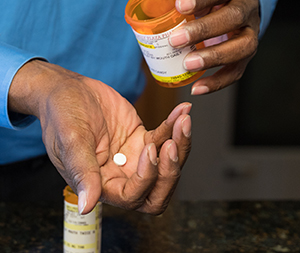Bipolar disorder causes extreme mood swings that can greatly disrupt your life. Your mood goes back and forth between depression and "mania." These symptoms may be upset you and those around you. But with treatment, you can lead a more normal life.
Medicines
Bipolar disorder is often treated with medicines that help make moods more stable. They help you feel better by keeping your moods more even. And they help prevent future mood swings. You may also be given medicines that treat depression. You may also get them when your thoughts and emotions are so affected that you lose contact with reality. The medicines you get are based on your symptoms and how you respond to the medicine. They are also based on the type of side effects you have and how severe they are. So both the dose and the type of medicine can change over time.
All medicines can have side effects. If you’re troubled by them, tell your doctor. Changing the dose or type of your medicine may help. But don’t stop taking them or change the amount you take until you talk with your doctor. Medicine changes that are not planned can cause bad side effects. Or your symptoms may return.
Talk therapy (psychotherapy)
Talking to a therapist or counselor may be part of your treatment. Having bipolar disorder can make it hard to hold a job or go to school on a regular basis. It can create stress for both you and your loved ones. A therapist can teach you how to cope with bipolar disorder. This can help you lessen manic or depressive episodes, or even prevent them. Your therapist can help you work out problems and heal relationships. They can also provide support when you need it most.
Medical treatment
Electroconvulsive therapy (ECT) is a medical treatment for bipolar disorder. It's also known as shock treatment. It can be used to treat bipolar disorder that doesn't respond to other treatments. With ECT, the brain is briefly stimulated with an electric current. It is done with the patient under anesthesia. This causes a controlled seizure. The seizure is thought to change the brain's chemistry. This may ease bipolar disorder symptoms.
Friends and family
Those closest to you may also need support. There are many groups for families of people with bipolar disorder. Learning more about this disorder can help your loved ones cope. It can also help them take an active role in your care.
Looking ahead
People with bipolar disorder have periods with no symptoms. They can function well in many settings. But it is a chronic illness that needs lifelong care. Just as with heart conditions or diabetes, bipolar symptoms can return. Treatments may need to be changed. Ongoing support by health care providers is key to being able to manage it long-term. Much research is being done on bipolar disorder. This research may lead to improved treatments and hope for a better future.
Call or text 988 during a crisis
If you are in a crisis or have thoughts of suicide or self-harm, call or text 988 right away. This is the 988 Suicide and Crisis Lifeline. You will be connected to a trained counselor you can talk to. There's also an online chat option. You can also call Lifeline at 800-273-TALK (800-273-8255). The 988 Lifeline is free and available 24/7.
To learn more
-
National Alliance on Mental Illness: 800-950-6264 or www.nami.org
-
National Institute of Mental Health: 866-615-6464 or www.nimh.nih.gov
-
Mental Health America: 800-969-6642 or www.nmha.org
-
988 Suicide and Crisis Lifeline: 800-273-TALK (800-273-8255) or www.suicidepreventionlifeline.org


